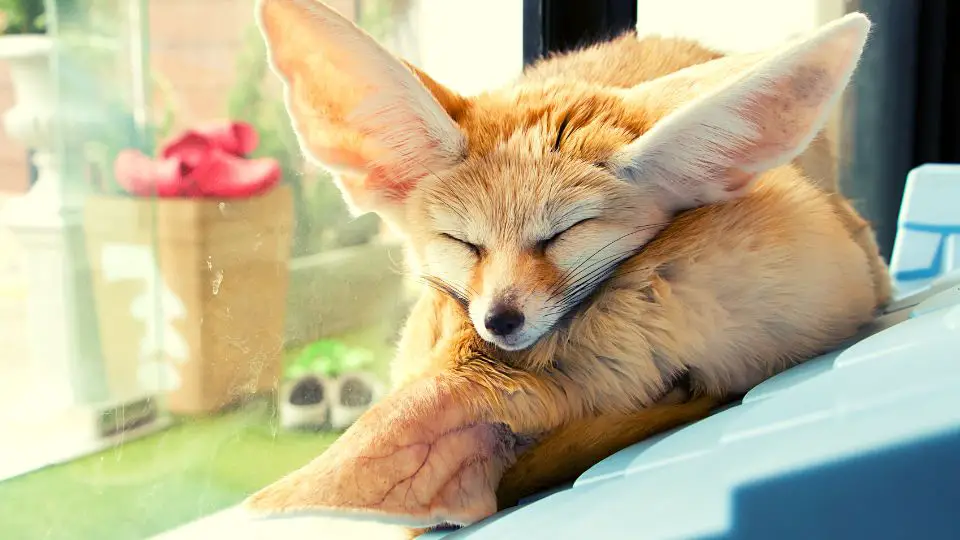Are you considering getting a fennec fox as a pet? It’s important to understand the specific housing and care requirements that are necessary to keep them healthy and happy.
In this article, we’ll cover the various housing and care requirements that fennec foxes need, including space requirements, environmental enrichment, temperature and humidity, diet and nutrition, health and veterinary care, socialization and training, and legal considerations.
Space Requirements
Fennec foxes are energetic and curious animals that require a significant amount of space to thrive. Providing a suitable living environment is essential to ensuring the physical and mental well-being of your fennec fox.
Indoor Space
When it comes to indoor space, the minimum enclosure size needed for a fennec fox is 4ft x 4ft x 2ft (L x W x H) per fox. The enclosure should be made of sturdy materials, have solid flooring, and provide ample ventilation. The fennec fox’s enclosure should also include hiding places, toys, and other furnishings that will provide stimulation and comfort.
When selecting bedding materials, you have to choose options that are soft and absorbent, such as towels, blankets, or a dog bed. Pine, cedar, or other aromatic bedding materials should be avoided, as they can be harmful to a fennec fox’s respiratory system.
Outdoor Space
Providing outdoor access for your fennec fox is highly recommended, as it provides the animal with fresh air, exercise, and mental stimulation. The outdoor play area should be securely fenced and have ample shade to provide protection from the sun. The area should also include a secure shelter to protect the fox from the elements and potential predators.
Ensure that the outdoor play area is free of hazards, including poisonous plants, sharp objects, or other potential sources of injury. You should always supervise your fox while outside to ensure its safety.
Play Areas
In addition to their indoor and outdoor enclosures, fennec foxes require ample opportunities for play and exercise. Indoor play areas should include toys and other obstacles that will keep the fox mentally stimulated and physically active. These could include items such as tunnels, platforms, and puzzle toys.
Interaction and Socialization
Fennec foxes are social animals and thrive on interaction with their human caretakers. Regular handling and socialization will help keep your fox comfortable and happy, and prevent aggressive or anxious behavior.
Be careful not to over-stimulate your fox, however, as your pet can become easily stressed or frightened. A regular routine of supervised playtime and socialization is recommended.
Temperature and Humidity
Fennec foxes are adapted to living in desert environments with hot days and cool nights, and require a specific temperature and humidity range to stay healthy and comfortable in captivity.
Ideal Temperature Range
The ideal temperature range for a fennec fox enclosure is 68 °F to 86 °F (20 °C to 30 °C). This range should be maintained consistently throughout the enclosure, with no significant temperature fluctuations.
Avoid exposing your little pet to extreme temperatures, as they can cause heatstroke or hypothermia.
To maintain the ideal temperature in a fennec fox enclosure, you can use a heat lamp or ceramic heater to provide warmth. Make sure to place the heat source at a safe distance from the fox and avoid creating any hot spots in the enclosure.
Ideal Humidity Range
The ideal humidity range for a fennec fox enclosure is between 30% and 50%. Maintaining proper humidity levels is important to prevent respiratory problems and keep the fox’s skin and coat healthy.
To maintain the ideal humidity range in a fennec fox enclosure, you can use a humidifier or misting system. Ensure that the humidity does not get too high, as this can create an environment that is conducive to mold or bacterial growth.
Monitoring Temperature and Humidity
Remember to monitor the temperature and humidity regularly using a thermometer and hygrometer. These tools will help you identify any fluctuations in temperature or humidity and make adjustments as necessary.
Diet and Nutrition
Fennec foxes are omnivores and require a balanced diet to stay healthy in captivity. Providing the appropriate food and nutrients is crucial to their well-being. Here’s what you need to know about the dietary requirements of fennec foxes, including what they should and shouldn’t eat, and how to provide a balanced diet.
What Fennec Foxes Should Eat
A fennec fox’s diet should consist of a variety of foods that provide the necessary nutrients for their growth and development.
Here is a list of the foods that fennec foxes should eat:
- High-quality, low-fat commercial dog food
- Lean meats, such as chicken, turkey, and rabbit
- Insects, such as crickets, mealworms, and waxworms
- Fruits, such as bananas, berries, and melons
- Vegetables, such as carrots, squash, and green beans
- Whole prey, such as mice, rats, and chicks
What Fennec Foxes Shouldn’t Eat
There are also some foods that fennec foxes should not eat, as they can be harmful to their health.
Here is a list of the foods that fennec foxes should not eat:
- Foods high in fat or sugar, such as chocolate or candy
- Dairy products, such as milk or cheese
- Onions and garlic
- Avocado
- Grapes and raisins
- Nuts and seeds
Providing a Balanced Diet
Providing a balanced diet for your fennec fox requires a combination of the right foods in the correct amounts. As a general guideline, the diet should consist of approximately 50% protein, 30% fat, and 20% carbohydrates.
It’s important to vary the types of food that you offer your fennec fox to ensure that they receive all the necessary nutrients. Whole prey items should be provided once or twice a week, while commercial dog food can be fed as a base diet. Fruits, vegetables, and insects can be used as treats or as a supplement to the main diet.
You should monitor your fennec fox’s weight and adjust their diet as needed to maintain a healthy body condition. Consult with your veterinarian if you have any concerns about your fox’s diet or nutrition.
Health and Veterinary Care
Fennec foxes require regular veterinary care to maintain good health. By understanding the common health issues and medical care that they may need, you can help keep your fennec fox healthy and happy.
Common Health Issues
Fennec foxes are generally healthy animals, but they are susceptible to certain health issues. Here are some of the most common health issues that fennec foxes may experience:
- Dental problems, such as overgrown teeth or gum disease
- Parasites, including fleas, ticks, and mites
- Respiratory infections
- Nutritional deficiencies
- Skin infections or allergies
- Eye problems, such as cataracts or conjunctivitis
Medical Care
To prevent and treat health issues, it’s important to provide regular medical care for your fennec fox. Here are some medical care tips to keep in mind:
- Schedule annual check-ups with a veterinarian who has experience treating exotic animals.
- Vaccinate your fennec fox against common diseases, such as rabies and distemper.
- Provide appropriate flea and tick prevention treatments.
- Monitor your fennec fox’s weight and diet to prevent nutritional deficiencies.
- Keep your fennec fox’s enclosure clean and dry to prevent skin infections.
- Keep your fennec fox’s eyes clean and monitor them for any signs of infection or disease.
Note that not all veterinarians have experience treating exotic animals, so it’s crucial to find a veterinarian who has experience with fennec foxes or other exotic animals.
Environmental Enrichment
Fennec foxes are curious and energetic animals that require mental stimulation to thrive in captivity. One way to provide this stimulation is through environmental enrichment, which includes providing hiding places, toys, and opportunities for foraging and digging.
Hiding Places
Fennec foxes are natural burrowers and require hiding places to feel secure and comfortable. Providing a variety of hiding places in their enclosure will allow them to exhibit their natural behavior and explore their environment.
Some suitable hiding places for fennec foxes include boxes, tunnels, and baskets, as well as built-in hiding spaces within their enclosure.
Toys
Toys are another way to provide mental stimulation for fennec foxes. A variety of toys should be provided to keep them interested and engaged.
Some toys that fennec foxes like include puzzle toys, stuffed animals, and balls.
Foraging and Digging Opportunities
Foraging and digging are natural behaviors for fennec foxes, and providing opportunities for them to do so will keep them mentally and physically stimulated. Some ways to provide foraging and digging opportunities for fennec foxes include scattering food around their enclosure, hiding treats in toys, or providing sandboxes for digging.
Ensure that any materials used in the fennec fox’s enclosure are safe and non-toxic and avoid using any materials that may be harmful to the fox’s health, such as pine or cedar shavings (these can be harmful to their respiratory system).
Socialization and Training
Fennec foxes are social animals that require proper socialization and training to ensure that they behave appropriately in captivity. Here’s what you need to know about the socialization and training needs of fennec foxes.
Socialization
Proper socialization is essential to ensure that fennec foxes behave appropriately around people and other animals. Socialization should begin at a young age and continue throughout the fox’s life.
Some tips for socializing your fennec fox include:
- Handle your fennec fox regularly to get them used to being touched and handled.
- Introduce your fennec fox to different people and animals in a controlled environment.
- Provide opportunities for your fennec fox to play with other animals.
- Expose your fennec fox to different sights, sounds, and smells to help them become comfortable in different environments.
- Gradually introduce your fennec fox to new experiences and environments to prevent overwhelming them.
- Avoid forcing your fennec fox to socialize if they are showing signs of fear or aggression.
- Reward your fennec fox with treats and praise for positive behaviors during socialization.
Monitor your fennec fox’s behavior during socialization and make sure that they are comfortable and not showing any signs of aggression or fear. If you notice any negative behaviors, stop the socialization and consult with an experienced exotic animal trainer.
Training
Training is also important to ensure that fennec foxes behave appropriately in captivity. Basic training can include behaviors such as litter box training, leash training, and coming when called.
Here are some tips for training your fennec fox:
- Use positive reinforcement techniques, such as treats and praise, to encourage desired behaviors.
- Keep training sessions short and positive to prevent frustration and stress.
- Start with basic behaviors and gradually move on to more complex behaviors.
- Be patient and consistent with your training, as it may take time for your fennec fox to learn new behaviors.
- Use a clicker or other marker to signal to your fennec fox when they have performed a desired behavior.
- Keep training sessions fun and engaging to keep your fennec fox interested and motivated.
- Avoid using punishment or physical force during training, as this can be counterproductive and may damage your relationship with your fennec fox.
- Train your fennec fox in a distraction-free environment to help them focus on the task at hand.
- Be flexible and adaptable in your training approach, as each fennec fox is unique and may respond differently to different training methods.
Note that fennec foxes are independent animals and may not respond well to traditional obedience training. It’s important to work with an experienced exotic animal trainer to develop a training plan that is appropriate for your fennec fox.
Legal Considerations
If you’re considering owning a fennec fox as a pet, it’s important to be aware of any legal considerations related to their ownership. These may include regulations and permits required by your state or country.
In the United States, fennec foxes are considered exotic pets and are regulated on a state-by-state basis. Some states prohibit their ownership altogether, while others require permits and/or registration. Before purchasing a fennec fox, you have to research the regulations in your state or country and ensure that you have any required permits or licenses.
In addition to state and country regulations, you must also consider the ethical considerations of owning a fennec fox as a pet. Fennec foxes are wild animals and may not adapt well to captivity.
By being aware of any legal regulations and ethical considerations related to owning a fennec fox, you can make an informed decision about whether or not they are the right pet for you.
Conclusion
Fennec foxes are charming and curious animals that can make wonderful pets for the right people. However, it is important to understand the responsibility of owning a fennec fox before taking one home. Potential owners should be familiar with their care needs, socialization, training, and legal requirements in order to provide them with a safe and happy life. With proper care and attention, a fennec fox can make an engaging and entertaining pet.







